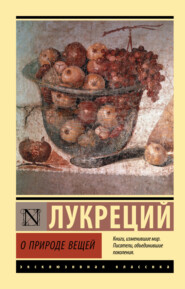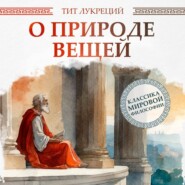По всем вопросам обращайтесь на: info@litportal.ru
(©) 2003-2025.
✖
On the Nature of Things
Настройки чтения
Размер шрифта
Высота строк
Поля
Withdrawn from cares; lest these my gifts, arranged
For thee with eager service, thou disdain
Before thou comprehendest: since for thee
I prove the supreme law of Gods and sky,
And the primordial germs of things unfold,
Whence Nature all creates, and multiplies
And fosters all, and whither she resolves
Each in the end when each is overthrown.
This ultimate stock we have devised to name
Procreant atoms, matter, seeds of things,
Or primal bodies, as primal to the world.
I fear perhaps thou deemest that we fare
An impious road to realms of thought profane;
But 'tis that same religion oftener far
Hath bred the foul impieties of men:
As once at Aulis, the elected chiefs,
Foremost of heroes, Danaan counsellors,
Defiled Diana's altar, virgin queen,
With Agamemnon's daughter, foully slain.
She felt the chaplet round her maiden locks
And fillets, fluttering down on either cheek,
And at the altar marked her grieving sire,
The priests beside him who concealed the knife,
And all the folk in tears at sight of her.
With a dumb terror and a sinking knee
She dropped; nor might avail her now that first
'Twas she who gave the king a father's name.
They raised her up, they bore the trembling girl
On to the altar—hither led not now
With solemn rites and hymeneal choir,
But sinless woman, sinfully foredone,
A parent felled her on her bridal day,
Making his child a sacrificial beast
To give the ships auspicious winds for Troy:
Such are the crimes to which Religion leads.
And there shall come the time when even thou,
Forced by the soothsayer's terror-tales, shalt seek
To break from us. Ah, many a dream even now
Can they concoct to rout thy plans of life,
And trouble all thy fortunes with base fears.
I own with reason: for, if men but knew
Some fixed end to ills, they would be strong
By some device unconquered to withstand
Religions and the menacings of seers.
But now nor skill nor instrument is theirs,
Since men must dread eternal pains in death.
For what the soul may be they do not know,
Whether 'tis born, or enter in at birth,
And whether, snatched by death, it die with us,
Or visit the shadows and the vasty caves
Of Orcus, or by some divine decree
Enter the brute herds, as our Ennius sang,
Who first from lovely Helicon brought down
A laurel wreath of bright perennial leaves,
Renowned forever among the Italian clans.
Yet Ennius too in everlasting verse
Proclaims those vaults of Acheron to be,
Though thence, he said, nor souls nor bodies fare,
But only phantom figures, strangely wan,
And tells how once from out those regions rose
Old Homer's ghost to him and shed salt tears
And with his words unfolded Nature's source.
Then be it ours with steady mind to clasp
The purport of the skies—the law behind
The wandering courses of the sun and moon;
To scan the powers that speed all life below;
But most to see with reasonable eyes
Of what the mind, of what the soul is made,
And what it is so terrible that breaks
On us asleep, or waking in disease,
Until we seem to mark and hear at hand
Dead men whose bones earth bosomed long ago.
SUBSTANCE IS ETERNAL
This terror, then, this darkness of the mind,
Not sunrise with its flaring spokes of light,
Nor glittering arrows of morning can disperse,
But only Nature's aspect and her law,
Which, teaching us, hath this exordium:
Nothing from nothing ever yet was born.
Fear holds dominion over mortality
Only because, seeing in land and sky
So much the cause whereof no wise they know,
Men think Divinities are working there.
Meantime, when once we know from nothing still
Nothing can be create, we shall divine
More clearly what we seek: those elements
From which alone all things created are,
And how accomplished by no tool of Gods.
Suppose all sprang from all things: any kind
Might take its origin from any thing,
No fixed seed required. Men from the sea
Might rise, and from the land the scaly breed,
And, fowl full fledged come bursting from the sky;
The horned cattle, the herds and all the wild
Would haunt with varying offspring tilth and waste;
Nor would the same fruits keep their olden trees,
For thee with eager service, thou disdain
Before thou comprehendest: since for thee
I prove the supreme law of Gods and sky,
And the primordial germs of things unfold,
Whence Nature all creates, and multiplies
And fosters all, and whither she resolves
Each in the end when each is overthrown.
This ultimate stock we have devised to name
Procreant atoms, matter, seeds of things,
Or primal bodies, as primal to the world.
I fear perhaps thou deemest that we fare
An impious road to realms of thought profane;
But 'tis that same religion oftener far
Hath bred the foul impieties of men:
As once at Aulis, the elected chiefs,
Foremost of heroes, Danaan counsellors,
Defiled Diana's altar, virgin queen,
With Agamemnon's daughter, foully slain.
She felt the chaplet round her maiden locks
And fillets, fluttering down on either cheek,
And at the altar marked her grieving sire,
The priests beside him who concealed the knife,
And all the folk in tears at sight of her.
With a dumb terror and a sinking knee
She dropped; nor might avail her now that first
'Twas she who gave the king a father's name.
They raised her up, they bore the trembling girl
On to the altar—hither led not now
With solemn rites and hymeneal choir,
But sinless woman, sinfully foredone,
A parent felled her on her bridal day,
Making his child a sacrificial beast
To give the ships auspicious winds for Troy:
Such are the crimes to which Religion leads.
And there shall come the time when even thou,
Forced by the soothsayer's terror-tales, shalt seek
To break from us. Ah, many a dream even now
Can they concoct to rout thy plans of life,
And trouble all thy fortunes with base fears.
I own with reason: for, if men but knew
Some fixed end to ills, they would be strong
By some device unconquered to withstand
Religions and the menacings of seers.
But now nor skill nor instrument is theirs,
Since men must dread eternal pains in death.
For what the soul may be they do not know,
Whether 'tis born, or enter in at birth,
And whether, snatched by death, it die with us,
Or visit the shadows and the vasty caves
Of Orcus, or by some divine decree
Enter the brute herds, as our Ennius sang,
Who first from lovely Helicon brought down
A laurel wreath of bright perennial leaves,
Renowned forever among the Italian clans.
Yet Ennius too in everlasting verse
Proclaims those vaults of Acheron to be,
Though thence, he said, nor souls nor bodies fare,
But only phantom figures, strangely wan,
And tells how once from out those regions rose
Old Homer's ghost to him and shed salt tears
And with his words unfolded Nature's source.
Then be it ours with steady mind to clasp
The purport of the skies—the law behind
The wandering courses of the sun and moon;
To scan the powers that speed all life below;
But most to see with reasonable eyes
Of what the mind, of what the soul is made,
And what it is so terrible that breaks
On us asleep, or waking in disease,
Until we seem to mark and hear at hand
Dead men whose bones earth bosomed long ago.
SUBSTANCE IS ETERNAL
This terror, then, this darkness of the mind,
Not sunrise with its flaring spokes of light,
Nor glittering arrows of morning can disperse,
But only Nature's aspect and her law,
Which, teaching us, hath this exordium:
Nothing from nothing ever yet was born.
Fear holds dominion over mortality
Only because, seeing in land and sky
So much the cause whereof no wise they know,
Men think Divinities are working there.
Meantime, when once we know from nothing still
Nothing can be create, we shall divine
More clearly what we seek: those elements
From which alone all things created are,
And how accomplished by no tool of Gods.
Suppose all sprang from all things: any kind
Might take its origin from any thing,
No fixed seed required. Men from the sea
Might rise, and from the land the scaly breed,
And, fowl full fledged come bursting from the sky;
The horned cattle, the herds and all the wild
Would haunt with varying offspring tilth and waste;
Nor would the same fruits keep their olden trees,







